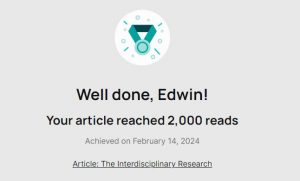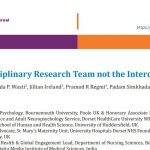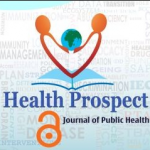The Interdisciplinary Research Team not the Interdisciplinarist
Worldwide there is a growing interest in multidisciplinary and interdisciplinary research. This overview paper addresses some of the pitfalls and barriers to being an interdisciplinary researcher. Being involved in interdisciplinary research is not an easy option for an individual discipline expert. It requires individual skills, ability to see beyond one’s discipline and perhaps personality characteristics such as a great team player. Interdisciplinary research may involve a mixed-methods approach underpinned by conflicting, and according to some incommensurable, research philosophies. The paper uses some examples from our own experiences of working in interdisciplinary teams to illustrate its potential.
 On Valentine’s Day we received a message from ResearchGate that our paper ‘The Interdisciplinary Research Team not the Interdisciplinarist’ has received 2,000 reads.
On Valentine’s Day we received a message from ResearchGate that our paper ‘The Interdisciplinary Research Team not the Interdisciplinarist’ has received 2,000 reads.
Prof. Edwin van Teijlingen
Reference:
Shanker S, Wasti SP, Ireland J, Regmi PR, Simkhada PP, van Teijlingen E. (2021) The Interdisciplinary Research Team not the Interdisciplinarist. Europasian J Med Sci.;3(2):111-5. Available from: https://www.europasianjournals.org/ejms/index.php/ejms/article/view/317
 New interdisciplinary paper
New interdisciplinary paper Promoting interdisciplinary research
Promoting interdisciplinary research Interdisciplinary Public Health
Interdisciplinary Public Health Reflections on doing interdisciplinary research
Reflections on doing interdisciplinary research










 BU academic publishes in online newspaper in Nepal
BU academic publishes in online newspaper in Nepal Final day of the ESRC Festival of Social Science
Final day of the ESRC Festival of Social Science Using Art to enhance Research
Using Art to enhance Research Register now to attend the 17th Annual Postgraduate Research Conference – Wednesday 3 December 2025
Register now to attend the 17th Annual Postgraduate Research Conference – Wednesday 3 December 2025 Portrait Concert featuring BU academic at L’Espace du Son Festival 2025, Brussels
Portrait Concert featuring BU academic at L’Espace du Son Festival 2025, Brussels ECR Funding Open Call: Research Culture & Community Grant – Application Deadline Friday 12 December
ECR Funding Open Call: Research Culture & Community Grant – Application Deadline Friday 12 December MSCA Postdoctoral Fellowships 2025 Call
MSCA Postdoctoral Fellowships 2025 Call ERC Advanced Grant 2025 Webinar
ERC Advanced Grant 2025 Webinar Horizon Europe Work Programme 2025 Published
Horizon Europe Work Programme 2025 Published Horizon Europe 2025 Work Programme pre-Published
Horizon Europe 2025 Work Programme pre-Published Update on UKRO services
Update on UKRO services European research project exploring use of ‘virtual twins’ to better manage metabolic associated fatty liver disease
European research project exploring use of ‘virtual twins’ to better manage metabolic associated fatty liver disease